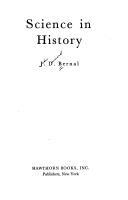Bernal (1937) "Psycho-Analysis and Marxism" in: The Labour Monthly, Vol. 19, July 1937, No. 7, pp. 435-437. Online here http://www.marxists.org/archive/bernal/works/1930s/psycho.htm on Marxists Internet Archive (2010).
Works

Science in History
John Desmond BernalFamous John Desmond Bernal Quotes
Source: The Social Function of Science (1939), p. 249
Bernal (1967) The Origin of Life, p. xv. Preface
Source: The world, the flesh & the devil (1929) (1969), p. 66
“Hogben's Science for the Citizen would be an admirable text-book for such teaching.”
Source: The Social Function of Science (1939), p. 260
Source: The Social Function of Science (1939), p. 415-416. Chapter XVI. THE SOCIAL FUNCTION OF SCIENCE. The Transformation of Science
John Desmond Bernal Quotes about science
“If science were communism, was it also not possible that communism could itself become a science?”
Attributed to Bernal in: Gary Werskey (1978) The visible college. p. 137
Bernal (1930s) "Labour Monthly Pamphlets, No. 6" (No date). Online ( here http://www.marxists.org/archive/bernal/works/1930s/engels.htm) on Marxists Internet Archive (2008).
Source: The Social Function of Science (1939), p. 306-307. Chapter SCIENTIFIC COMMUNICATION. The Function of Scientific Publication. See also World Brain
J.D. Bernal (1959/1969) Science in history Vol 3. p. 862; cited in: Ludwig von Bertalanffy (1968) General System Theory. p. 5-6
John Desmond Bernal Quotes
Source: The world, the flesh & the devil (1929) (1969), p. 48 as cited in: C. K. Ogden (1995) Psyche. 10. 1929/30 p. 116
Bernal (1969) Science in History. Vol 3. p. 823
J.D. Bernal (1937) "Dialectical Materialism and Modern Science" in: Science and Society, Volume II, No. 1, Winter 1937; Online ( here http://www.marxists.org/archive/bernal/works/1930s/dsams.htm) on Marxists Internet Archive (2002).
Source: The world, the flesh & the devil (1929) (1969), p. 63
Source: The Social Function of Science (1939), p. 246 : How such a method of teaching could become an integral part of general education is sketched by H. G. Wells' British Association address, "The Informative Content of Education," reprinted in World Brain (Mathuen, 1938).
Source: The world, the flesh & the devil (1929) (1969), p. 3. Intro of part I. The Future ( online http://www.marxists.org/archive/bernal/works/1920s/soul/ch01.htm)
Source: The world, the flesh & the devil (1929) (1969), p. 68
“[S]cience has so changed its nature over... human history that no definition could be made to fit.”
Preface
Science in History (1954)
Preface
Science in History (1954)
“It would be as one-sided to assess the effects of science on society as of society on science.”
Preface
Science in History (1954)
